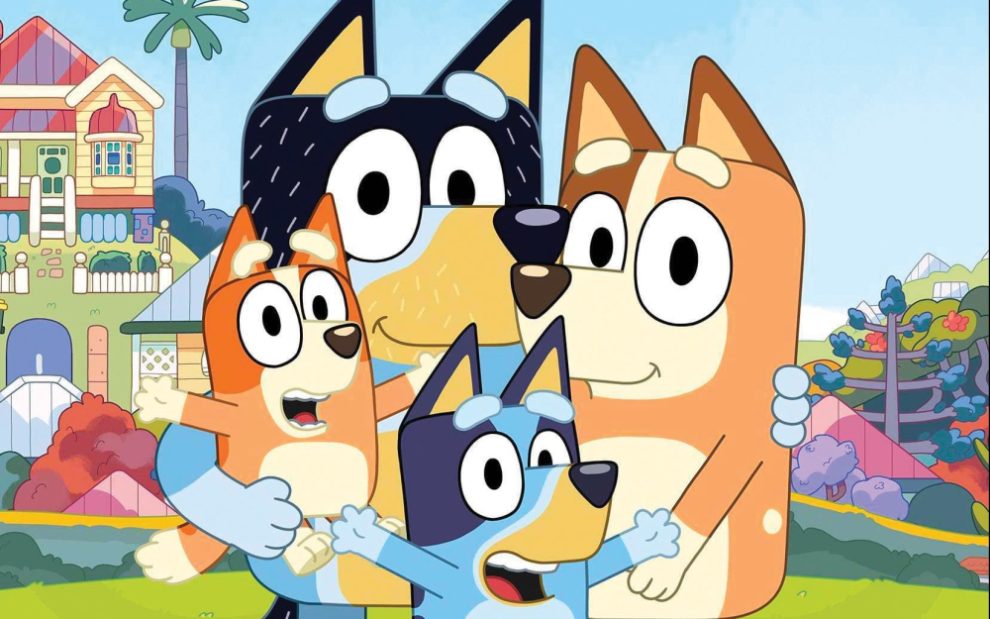One of cinema’s most thoughtful and challenging filmmakers, Robert Bresson, once acknowledged that when he simply wanted some entertainment, he would watch a Charlie Chaplin film. This is in no way to diminish Chaplin’s films; Chaplin was a comic genius and so observant of human nature—something Bresson likely appreciated. Instead, it’s to highlight the subtle significance of how we entertain ourselves.
What we watch for entertainment and simple pleasure not only says something about who we are; it shapes us. What do you watch regularly for entertainment? Is it a zombie apocalypse series or perhaps a reality TV dating show? More importantly, how does this regular “entertainment” affect the way you see the world? While this at first may seem innocuous, think of how your perspective changes when you consider what your children watch on a regular basis. My 5-year-old niece recently introduced me to Bluey, a delightful cartoon series about a family of dogs and, to my surprise, my days are all the better for it!
Bluey is an Australian animated television series that, because of its unique perspective, has garnered the attention of audiences worldwide. Its premise is simple. It centers on a small family of dogs, Mum (Chilli), Dad (Bandit), and their daughters, Bingo and Bluey. Fans of the show are already inadvertently humming the theme song.
While so many children’s shows today focus on characters with special powers, fighting crimes, or saving the day, Bluey’s characters may seem rather modest by comparison. Mum and Dad juggle work with raising children and hope to impart life lessons to their children—when they can be clever enough to make that work. Their children, Bluey and Bingo, love playing, have rich imaginations, insecurities, meaningful bonds with family and friends, and moments of selfishness. In short, they’re not much different from many families. Significantly, however, they’re a family that is warmly and unironically engaged in one another’s lives, which is wholeheartedly refreshing. Each has their moments of “grows” and “glows.” And, importantly, each one will make you laugh and smile.
My niece’s curated tour through the series began with an episode titled “Hospital” where Dad, a little worn out from a full day of playing with the children, asks if there is a game they can play where he can lay down. The children ecstatically scream “hospital,” and Dad becomes a patient with Bluey and Bingo assuming the roles of doctor and nurse. My niece not only introduced this as “a really funny one” but proceeded to say the lines of each character, mimicking their voices in perfect sync.
Her next recommendation was an episode titled “Camping,” and here’s where the series really shines. In this episode, Mum and Dad take Bluey and Bingo camping. Bluey wanders away from the camp to build a house with sticks. There she meets another dog, Jean Luc. Jean Luc speaks only French but still wants to be her friend. Bluey doesn’t skip a beat, and the two of them embark on daily adventures of building a house, learning to communicate to battle the “wild pig” that Bluey’s dad pretends to be, and, poignantly, planting a little tree seed and watching every day to see if it grows.
If the entire episode was just about these two children, divided by language and culture but playing together and becoming friends, it would be well worthwhile. Yet the superb writing of the series gently takes the story to a much deeper level when Jean Luc says goodbye one evening explaining that their family is going home, but Bluey doesn’t understand. She awakes to see the tiny seed finally sprouting above the soil and races to tell Jean Luc. What follows is an amazing and sensitive portrayal of sorrow, joy, parenting, and a rich appreciation of the giftedness of each day.
Once you open the Bluey hymnal, you’ll find family, friends, coworkers, and so many others have their favorite moments and episodes to share, such as “Baby Race,” “Sleepytime,” “Dance Mode,” “Fruit Bat,” “Flatpack,” “Faceytalk,” and “Duck Cake.” Many love the positive way fathers are portrayed in the show. Others enjoy the significant insights into mothers’ experiences the series offers. Perhaps one of the best episodes in the series, “The Show,” highlights this, where Bingo and Bluey put on a play for their mum on Mother’s Day. Amidst all the fun and silliness is a much more meaningful lesson on how daughters gain strength from their mothers. Chilli won’t be the only one who tears up at the end of this episode.
As we began with Bresson and Chaplin, artistic achievement should not be overlooked. Bresson, much noted for his very selective use of classical music, would have certainly chuckled at the classical music selections so cleverly integrated into the series. Selections from Mozart, Holst, Vivaldi, and Grieg are woven into the episodes. An imaginative use of Tchaikovsky’s “Waltz of the Flowers” while Bluey and Bingo somewhat contentiously dance trying to lick each other’s ice cream cones is both silly and enchanting. Add to this episodes like “Rain” that convey their meaning almost entirely without words, or “Curry Quest,” which showcases Joseph Campbell’s stages of the classical hero’s journey in the most unexpected way, and you’ll quickly see why adults can enjoy Bluey as easily as children. And while religion isn’t at the forefront of the show, Christmas and Easter episodes quietly normalize family traditions and raise up the deeply held values beneath those traditions.
If this seems a little too commonplace, then you might have lost some of the delight and surprise of the ordinary that artists such as Charlie Chaplin knew so well. I’ve often thought that God must truly delight in humanity for generations to continue through the centuries much beyond anything St. Paul ever imagined. God is always bigger than anything we might imagine and also more attentive to the little things.
One of my favorite lines in Bluey so far comes from Bingo after she excitedly picks out her birthday cake and notices her tail wagging. She says to her mum, “Mum, how do animals with no tails know they’re happy?” Her mum wisely responds, “Good question.” I notice a smile on my face as one episode of Bluey ends and another begins.
This article also appears in the July 2023 issue of U.S. Catholic (Vol. 88, No. 7, pages 36-37). Click here to subscribe to the magazine.
Image: Ludo Studio














Add comment